When deciding which books to read, I usually ask myself some of the following:
- Is it by someone whose work I’ve enjoyed in the past?
- Does the plot seem interesting?
- Is the concept unique?
- Does the lead character sound like someone I can root for?
- Is it by someone who has been compared to an author I like?
- Does it take place somewhere I’d like to visit?
- Is it about a topic I don’t know much about but find fascinating?
- Is the cover art pretty? (What? I like pretty.)
But in the last month, I received two novels that made me immediately want to read them based mostly on the authors’ bios, something that has never happened before. The first was The Informationist by Taylor Stevens and the second was Spycatcher (William Morrow, 8/9/11) by Matthew Dunn. Both are debut novels.

Stevens, from her site
I’m finishing up Informationist and plan to review it sometime in the next week so I’ll touch more on Stevens’s past then. In the meantime, here’s what it says on her website:
In an alternate universe, I spent my formative years living with parents and siblings, showing up for school and getting acquainted with HBO, Michael Jackson, neon clothes and big hair. In reality, childhood and adolescence were spent begging on city streets from Zurich to Tokyo, preparing food and washing laundry for hundreds of people, and otherwise trying to survive dreary life as a worker bee child in a communal apocalyptic cult. My innocence and scholastic education stopped completely when I was twelve-years-old.
Cut off from personal family, at times under the care of sadistic individuals and without access to books or television from the outside world, imagination became a survival mechanism. As a young teenager, I secretly entertained commune children with fantastic stories that took us through time and space, until these sins were discovered by cult leaders. Several laboriously hand-written books were confiscated and burned and I was ordered on pain of–well, a whole lot of pain–never to write again.
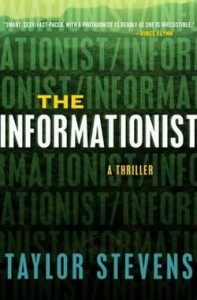 The nomadic culture of the cult became an adolescent’s journey across four continents and nearly two dozen countries culminating in four years living in East and West-Central Africa–this the primary setting for THE INFORMATIONIST…
The nomadic culture of the cult became an adolescent’s journey across four continents and nearly two dozen countries culminating in four years living in East and West-Central Africa–this the primary setting for THE INFORMATIONIST…
…I was in my twenties when I broke free, and leaving everything I knew brought with the fear, a fresh beginning. Refusing to go to my grave with regrets, “what ifs,” or tears over the lost years, I set out to take back what was taken from me. Through trial and error and observing the masters I taught myself the craft, and gradually the gift of storytelling returned. Learning basics that many take for granted has been a journey to be sure, but on the flip side, if I ever need to make breakfast for 150 people, I’ve already got that covered.
How can someone who has experienced all that not have incredible stories to tell? And without knowing more about the book, I knew this before starting it: Stevens’s heroine would be a survivor.
The other novel, Spycatcher, came with this author bio:

Photo by Adam Scourfield
As an MI6 field operative, Matthew Dunn recruited and ran agents, coordinated and participated in special operations, and acted in deep-cover roles throughout the world. He operated in highly hostile environments where, if compromised and captured, he would have been executed. Dunn was trained in all aspects of intelligence collection, deep-cover deployments, small arms, explosives, military unarmed combat, surveillance, and infiltration.
 Medals are never awarded to modern MI6 officers, but Dunn was the recipient of a very rare personal commendation from the secretary of state for foreign and commonwealth affairs for work he did on one mission, which was deemed so significant that it directly influenced the successful conclusion of a major international incident.
Medals are never awarded to modern MI6 officers, but Dunn was the recipient of a very rare personal commendation from the secretary of state for foreign and commonwealth affairs for work he did on one mission, which was deemed so significant that it directly influenced the successful conclusion of a major international incident.
During his time in MI6, Dunn conducted approximately seventy missions. All of them were successful.
The back cover also mentions he’s “one of the first in modern memory to write novels under his own name.”
After reading this, I immediately cracked it open and went straight to the first chapter without even glancing at the plot synopsis. How could I resist? That bio says, “This guy’s got balls and he’s a real-life Bond.” And yup, the first chapter is pretty good.
Now, I’m not suggesting every author use their personal stories in their marketing campaigns; I’d guess that few have a background as extraordinary as Stevens and Dunn’s. Reading about how someone toiled in a cubicle for years before selling their first book just isn’t as exciting. Ultimately, it’s the writing and the fictional story within the pages that will hold readers’ interest anyway.
But I couldn’t help but think: When an author’s life is as riveting as any thriller you’ve read, should it be spotlighted more in the marketing campaign? If you attend a signing of such an author, would you want them to share tales from their past or discuss the book only? If their personal stories are highlighted to sell books, is it exploitation? Discuss!
 Despite this novel’s title, do not read it at bedtime. Because you won’t sleep. Next thing you know, it’ll be 5 a.m. and you’ll be wondering how the night had vanished.
Despite this novel’s title, do not read it at bedtime. Because you won’t sleep. Next thing you know, it’ll be 5 a.m. and you’ll be wondering how the night had vanished.





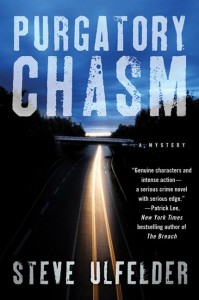
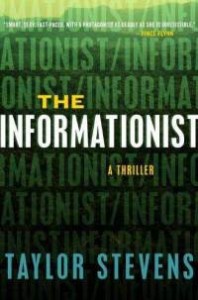
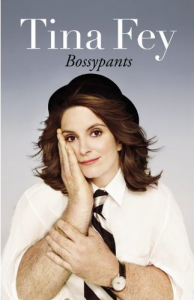
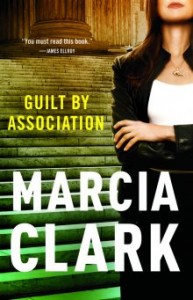





 Medals are never awarded to modern MI6 officers, but Dunn was the recipient of a very rare personal commendation from the secretary of state for foreign and commonwealth affairs for work he did on one mission, which was deemed so significant that it directly influenced the successful conclusion of a major international incident.
Medals are never awarded to modern MI6 officers, but Dunn was the recipient of a very rare personal commendation from the secretary of state for foreign and commonwealth affairs for work he did on one mission, which was deemed so significant that it directly influenced the successful conclusion of a major international incident.